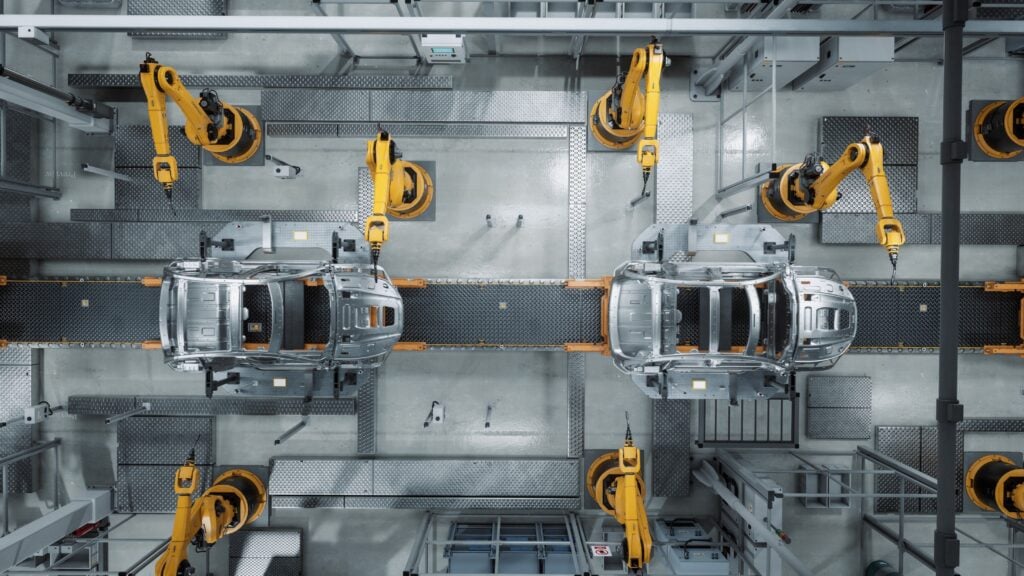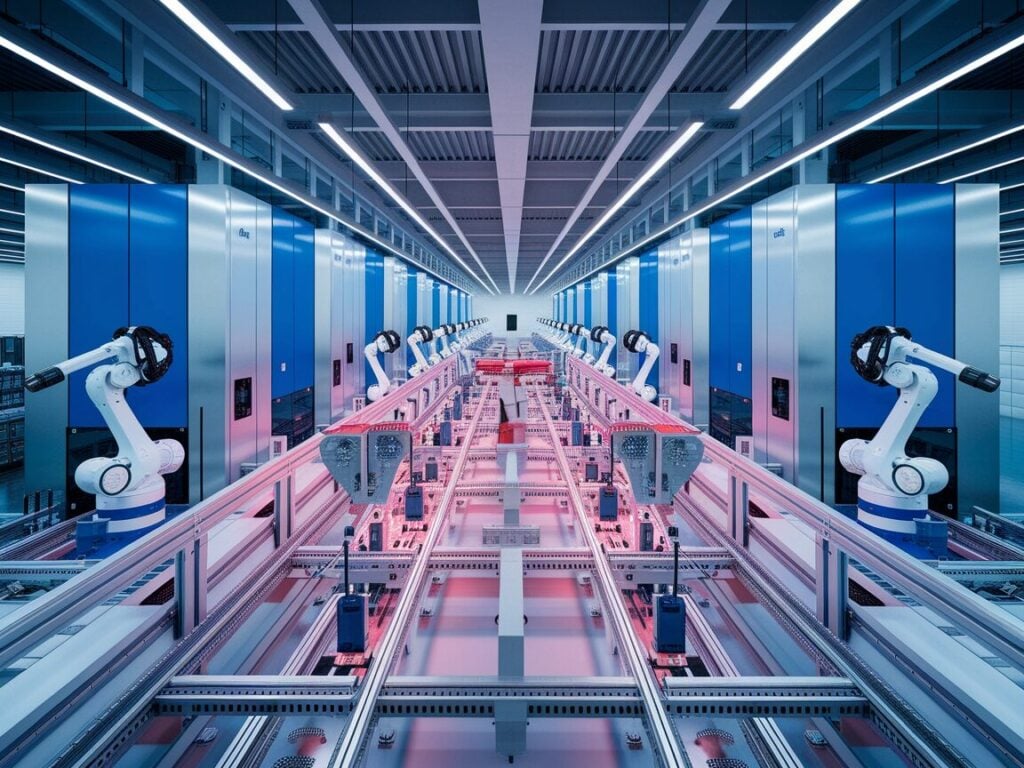The artificial intelligence revolution has arrived, and it’s here to stay. ChatGPT has provided us the indisputable evidence that this long-awaited technology is entering a more mature—and more valuable—stage.
In fact, generative AI will produce between $170 billion and $290 billion in value for the advanced manufacturing industry alone, according to new data from McKinsey & Company. Across all industries, McKinsey says the technology will add between $2.6 trillion and $4.4 trillion in value. I’m no CFO, but those are some seriously big numbers.
Of course, manufacturers must take action to grab the opportunity. With that in mind, here’s a nuts-and-bolts breakdown of how manufacturers should be thinking about AI.
Objective Number One: Understand What AI Is and How It Works
It will be difficult for manufacturing executives to capture AI value if they’re unclear about what the technology is. And while you won’t need to understand it at the level of, say, a developer, having a grasp on the underlying processes can go a long way.
Simply put, AI occurs when computers are programmed to think and learn like humans. Developers create algorithms that train AI engines on datasets—some of them very, very massive—so that they can develop the ability to perceive their environment and make decisions. Imagine that your smartest team member could download all the knowledge from every data point on your shop floor and then use that information to make instant, highly informed decisions.
Fundamentally, AI is a set of empirical connections and patterns the computer sees that make probabilistic predictions. For example, in ChatGPT, when you ask a question, it draws on its entire data set—i.e., everything written on the internet—for things that reference your question. Then, it pieces together an answer word-by-word, using probabilities to determine which words come next in the response. For example, there is a high probability that the word “tree” follows the word “oak.” What makes AI so different from today’s programming is its reliance on those probabilities. Most software relies instead on clear formulas. Without AI, “oak tree” would only appear if you specifically told the computer that whenever “oak” comes up, “tree” should follow.
For manufacturers, AI is a natural extension of automation efforts. You’ll need strong and comprehensive data coming from sensors. Most manufacturers won’t be pursuing novel AI implementations themselves. ERP systems and computer-controlled equipment will start integrating it standard into their designs. In fact, OEMs are already working on it. So, manufacturers who want to be ready for AI faster should consider installing sensors on your shop floor, or even aggregating the data that newer equipment already produces. Manufacturers who experiment now by analyzing that data will have a leg up on the competition. Monitoring production in real-time and using low-cost data display and AI analysis tools is a way for manufacturers to immediately bump their productivity.
For that matter, a word of caution: AI works best when it builds on or replaces existing manual processes that already work. AI may struggle to make sense of broken processes. But when you hand it something that functions as is, it goes to work to automate and optimize.

We can help you find the best talent! Contact us today
Some Examples of AI Use Cases in Manufacturing
AI will help manufacturers optimize everything from the shop floor to the back office. Here are a few examples:
Getting ahead of machine maintenance. Once you’ve equipped your shop floor with sensors, AI can go to work analyzing their performance, understanding warning signs of failure, and even proactively scheduling maintenance before issues occur.
Improving precision and speed. Some of your most repetitive tasks on the assembly line are ripe for automation, but with AI-driven robots, those processes learn to run even smoother over time. The technology will help you improve precision and increase production speed.
Optimizing your resources and reducing waste. AI can help ensure you’re getting the absolute most possible production out of the people, materials, and machinery within your operation. By learning your needs and assets, AI can help you make intelligent decisions about resourcing including how you layout your plant, reduce waste, enhance scheduling, and make design choices for engineered products.
Compiling competitive research and creating quick content. AI can help manufacturers quickly find, synthesize, and analyze how competitors sell their products online, lowering the access barrier to competitive market research. Couple that with the ability to quickly generate content for content marketing strategies, targeted and customized emails and outreach, and social media posting.
Enhancing communication along the supply chain. It may take a while to get there, but AI can and should eliminate so many of the problems that hinder our supply chains. From automatically tracking delivery ETAs to automating ordering and invoicing based on data-driven projections of supply and demand, AI will help us build more resilient and efficient supply chain processes.
Creating a safer environment. Once AI gets to know your working environment via sensors and cameras, it can learn the warning signs of potential safety threats and alert floor managers to mitigate issues.
Mimicking operator experience. A more advanced application of AI involves turning tasks that have generally required years of experience into more exact, scientific procedures that lead to the right outcomes. Think of, for instance, how only an experienced operator has been able to manipulate a machine into just the right shape. With enough data input, AI can match human intuition.
Knowledge transfer. Sometimes taking years of tribal knowledge and putting it down on paper just isn’t feasible for someone who knows it all by heart. AI can fast-track that knowledge transfer through programs that serve future employees making complicated decisions, like choosing the right combination of materials for a specific application.
Preparing for a Future With AI
There’s much talk about whether and how many jobs AI will replace. The manufacturing industry is short so many workers right now, the chances of that happening any time soon, from where I sit, are very slim. But here’s what folks should be concerned about: losing their job not to AI, but to someone who knows how to fully leverage it. AI will be the great productivity enhancer. And we need it.
And, ultimately, artificial intelligence is just one more step forward on a manufacturer’s automation journey. For all intents and purposes, that journey begins with equipping your operation with sensors so you have a clear, data-driven view of your shop floor. Those sensors will provide invaluable data that will lead to better decisions, whether those decisions are made by human beings or by artificial intelligence. In other words, by the time you’re ready to implement AI, you’ll already be seeing the return on investment.
AI will help you take that return even further, allowing you to efficiently optimize your processes and get better results. You’ll be able to gain precision and speed along the assembly line, create better communication along the supply chain from one vendor to the next, and create a safe environment for your workers. AI can already create massive value for manufacturers, and this technology is only going to expand from here. Make sure you’re ready for it.
ARTICLE BY: ETHAN KARP – Forbes | Published: 08/14/2023






